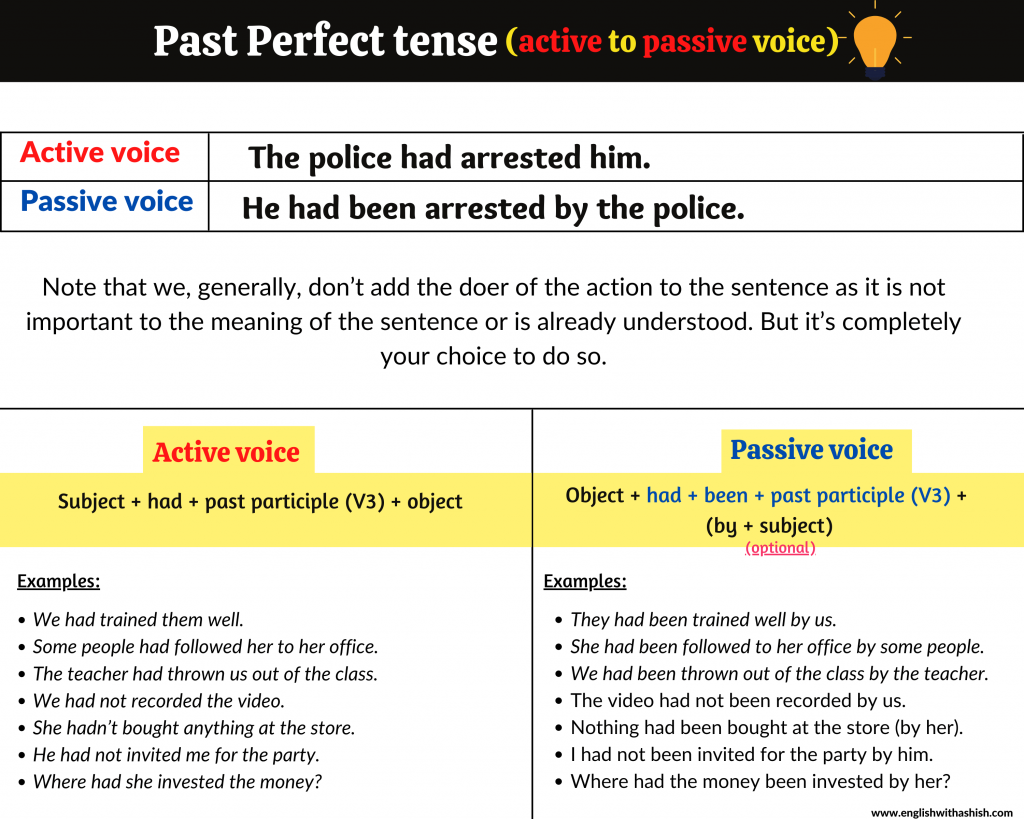In this post, we will learn how to use the Past Perfect passive voice and how to change the active voice into the passive voice of the Past Perfect tense.
Active and passive voice in the Past perfect tense
The Past Perfect tense is usually used to refer to an action in the past that took place prior to a certain time in the past or a past action.
When to use the active voice in the Past perfect tense?
We write sentences in the active voice of the Past perfect tense when we want to focus on the person/people who had performed an action in the past before another action or time.
Structure: Subject + had + past participle (V3) + object
- Subject = the doer of the action
- Object = the receiver of the action
Examples:
- She had finished the project before the deadline came.
- The judge had dismissed the matter when it came to my notice.
In these examples, we are focusing on the person/people who had performed the action in the past.
When to use the passive voice in the Past perfect tense?
Sentences are written in the Past Perfect tense passive voice when we want to focus on the receiver of the action: when we want to talk about what or whom the doer of the action had acted upon.
And since we shift the focus to the object of the verb from the subject (the doer of the action), the object becomes the subject, and the subject (doer) becomes an irrelevant or less important entity in a sentence, and therefore; it is usually not mentioned in the sentence.
Structure: Object of the verb + had been + past participle (V3) + by + subject (doer)
- The object of the verb = the subject of a passive sentence
Examples:
- The project had been completed (by her) before the deadline came.
- The matter had been dismissed (by the judge) when it came to my notice.
| Active voice: | Subject (doer) | had | V3 | object (receiver) |
| Passive voice: | object (receiver) | had + been | V3 | (by + subject(doer)) |
- Active: I had paid the money.
(focusing on the doer of the action ‘I’)
- Passive: The money had been paid (by me).
(focusing on the object that the action was acted upon: the money)
Note that we, generally, don’t add the doer of the action to the sentence as it is not important to the meaning of the sentence or is already understood. But it’s completely your choice to do so.

Changing active voice into passive voice in the Past Perfect tense
Active: We had trained them well.
Passive: They had been trained well (by us).
Active: Some people had followed her to the office.
Passive: She had been followed to the office (by some people).
Active: The teacher had thrown us out of the class.
Passive: We had been thrown out of the class (by the teacher).
Active: They had copied all my answers.
Passive: All my answers had been copied (by them).
Active: Someone had stolen my car before I reached home.
Passive: My car had been stolen (by someone) before I reached home.
Active: The police had arrested him.
Passive: He had been arrested (by the police).
Active: His parents had warmed him before he did the crime.
Passive: He had been warned (by his parents) before he did the crime.
Active: She had saved my family from those people.
Passive: My family had been saved from those people (by her).
Negative sentences (Active and voice voice)
| Active voice: | Subject | had | not | V3 | object |
| Passive voice: | Object | had + been | not | V3 | by + subject (optional) |
Active: He had not invited me to the party.
Passive: I had not been invited to the party (by him).
Active: Sam hadn’t helped us at all.
Passive: We hadn’t been helped at all (by Sam).
Active: We had not recorded the video.
Passive: The video had not been recorded (by us).
Active: She hadn’t bought anything at the store.
Passive: Nothing had been bought at the store (by her).
NOTE: If ‘anything‘ is the object of the verb in the active voice of a negative sentence, it will change to ‘nothing‘ in the passive voice.
Interrogative sentences (Active and passive voice)
| Active voice: | Question words (if any) | had | subject | V3 | object? |
| Passive voice: | Question words | had | object | been + V3 | (by + subject)? |
Examples:
Active: Had you called me?
Passive: Had I been called by you?
Active: Had he not helped you with your assignment?
Passive: Had you not been helped with your assignment by him?
Active: Had they contacted you for the class?
Passive: Had you been contacted for the class by them?
Active: Where had she invested the money?
Passive: Where had the money been invested (by her)?
Active: Why had you sold the car?
Passive: Why had the car been sold (by you)?
Active: What had you taken before lunch?
Passive: What had been taken before lunch (by you)?
Practice!
- Nobody had helped me in my tough times.
- My friends had supported my family.
- Some people had attacked his wife.
- Where had he taken the money from?
- Had they called her?
- How had you done that?
- Everyone had mocked me for my pronunciation.
- They hadn’t released the movie before the end.
- Somebody had deposited a lot of money into my account.
- I had not caught the train.
Answers:
- I had not been helped in my tough times by anyone.
- My family had been supported by my friends.
- His wife had been attacked by some people.
- Where had the money been taken from by him?
- Had she been called by them?
- How had that been done by you?
- I had been mocked for my pronunciation by everyone.
- The movie hadn’t been released before the end.
- A lot of money had been deposited into my account by someone.
- The train had not been caught by me.
Now, we know everything about compound subjects. Feel free to share your question, doubt, or feedback in the comment section, and also, share the post with the people that need it.
For one-on-one classes, contact me at [email protected].
What is an Object Complement? A free detailed guide
In this post, we learn what an object complement is, and how to use and…
What is a predicate adjective? Examples and rules
In this post, we learn what a predicate adjective is, how to identify it, and…
Prepositions of time (examples and quiz)
In this post, we learn what prepositions of time are, and how they are used…
ADVERBS OF TIME
In this lesson, we learn what adverbs of time are, and how to use them…
What is a predicate nominative? Examples, tips and quiz
In this lesson, we learn everything about a predicate nominative in English. What is a…
Subject complement: types, examples and quiz
In this lesson, we learn what a subject complement is, how to identify it, and…






Excellent
Thank you, Isma.
this is so helpful ,thanks
Glad you liked it, Colianna!
So bad
Hi,
Can you be specific and help me understand what exactly you didn’t like about the lesson? That’d be helpful.